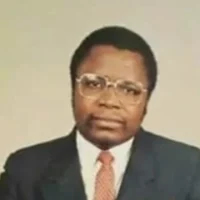The end of World War II ushered in an era of intense arms competition between the Soviet Union and the United States. Both sides produced nuclear armaments and other weapons of mass destruction at increasing rates as the bipolar world order evolved, finally achieving a state known as “mutually assured destruction” or MAD. President Eisenhower… Read More "Stop the MADness — Arms Control and Disarmament"
The Stolen Victory and Mysterious Death of Moshood Abiola
In June 1993, Chief Moshood (M.K.O.) Abiola, a Muslim businessman and philanthropist, ran for the presidency of Nigeria and appeared to win the popular vote in what was considered a free and fair election. The vote was annulled by Nigeria’s military leader on the basis that the election was corrupt. When Abiola rallied support to… Read More "The Stolen Victory and Mysterious Death of Moshood Abiola"
Julia Chang Bloch’s Whole-of-Mission Approach in Nepal
In 1990, Nepal’s centuries-long history of monarchical rule and more recent autocratic substitutes were finally brought to an end in what may consider to be one of the most notable non-violent revolutions of the twentieth century. With the death of King Mahendra in 1972, the future of Nepal’s government was uncertain. His son, King Birendra,… Read More "Julia Chang Bloch’s Whole-of-Mission Approach in Nepal"
Survivor of Two Concentration Camps, U.S. Ambassador to Three Countries
Robert Gerhard Neumann (1916–1999), seen at right with wife Marlen, served as U.S. Ambassador to Afghanistan, Morocco, and Saudi Arabia. Born in Vienna, Austria, he belonged to political activist groups as a student. While studying in Geneva, he was arrested by the Nazis and imprisoned for almost a year, spending part of that time in… Read More "Survivor of Two Concentration Camps, U.S. Ambassador to Three Countries"
Escape from Japanese Internment in China
In June of 1937, Beijing became one of the first cities to fall as Japanese forces began their conquest of China. In contrast to the atrocities committed by Imperial forces during their capture of Nanjing in December of that year, residents of Beijing lived relatively peaceful lives after occupation. This included the city’s population of… Read More "Escape from Japanese Internment in China"
The Return of the King — Saud Visits the U.S.
Visits by dignitaries of other countries can be quite productive and even pleasant or, depending on the state of bilateral relations and the scale of faux pas, tetchy and awkward. Such was the case with King Saud, who ruled over Saudi Arabia from 1953-1964 and visited the United States two times during his reign— an… Read More "The Return of the King — Saud Visits the U.S."
Taking the Chill off the Cold War: The First Reagan-Gorbachev Summit
The Geneva Summit of 1985 was the first meeting between President Reagan and Soviet General Secretary Gorbachev to talk about the arms race, particularly the Strategic Defense Initiative, and to establish personal relations between the leaders of the world’s superpowers. Held November 19, 1985 at a chateau owned by the Aga Khan, the first meeting went over… Read More " Taking the Chill off the Cold War: The First Reagan-Gorbachev Summit"
Warriors without Weapons – Recruiting FSOs to Rebuild Iraq
In the lead-up to the 2003 American invasion of Iraq, State Department officials realized they would need to deploy scores of Foreign Service Officers familiar with the language and culture of Iraq to put the country back on the path to successful governance once the fighting was over. Finding officers with the necessary skills to… Read More "Warriors without Weapons – Recruiting FSOs to Rebuild Iraq"
Liberia erupted in violence on April 12, 1980 as Master Sergeant Samuel Kanyon Doe seized power from President William Tolbert, ending 133 years of political dominance by Americo-Liberians. Americo-Liberians traced their ancestry to African Americans and Black British subjects who immigrated to Africa and became the founders of the Republic of Liberia, in power from 1847-1980. In October… Read More "Surviving the Coup that Transformed Liberia"
Iran-Contra: Who Knew What When?
In the Iran-Contra Affair, Colonel Oliver North and others within the National Security Council and CIA used back channels and secret bank accounts to funnel money from arms deals with Iran, which was then under an arms embargo, to the Contra rebels fighting the Marxist Sandinistas in Nicaragua. One aim of this plan was to… Read More "Iran-Contra: Who Knew What When?"

